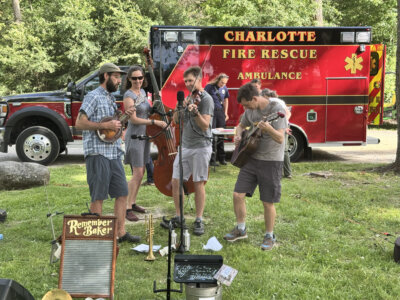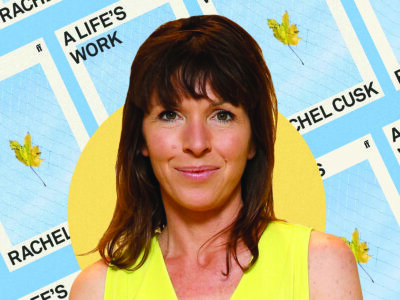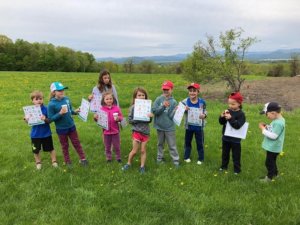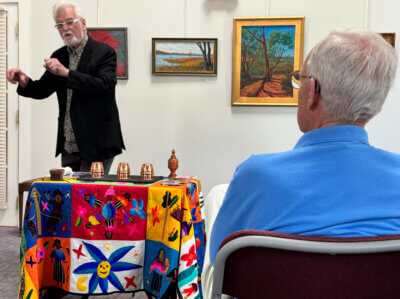Exploring sounds at sea with Joe McKee
Greetings from Los Angeles,
Lately, I’ve had a screaming desire to travel. I don’t particularly care where; I just want to get out of the house. Maybe I’m antsy approaching the pandemic’s light at the end of the tunnel; perhaps I’ve grown weary of my cat’s meowing me to consciousness each morning. I just know that I want to feel the sweet breeze of getting from point A to point B flow through my hair. I could use a change of pace.
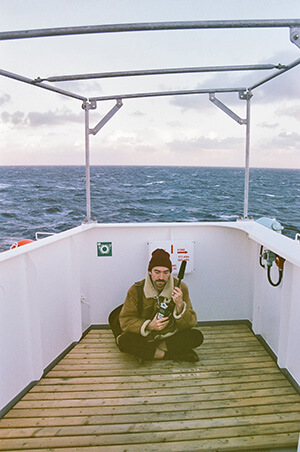
With my cabin fever in mind, I spoke with Los Angeles-based Australian artist Joe McKee: musician, record label owner and creative wizard whom I admire for many reasons—one of which being that he traveled a great distance to produce his latest album, Ultra Letizia. His 2018 record, An Australian Alien, is wonderfully lyrical and personal—a theatrical, folky, psychedelic work that remains in constant rotation on my turntables to this day. McKee’s own imprint, Baby Race Records, is consistent in releasing compelling music from a variety of artists, all of which are completely new to me.
Stylistically and conceptually, McKee’s newest album daringly ventures from the rest of his discography. Ultra Letizia is the soundtrack to visual artist Cole Sternberg’s film Are the Green Fields Gone, documenting Sternberg and McKee’s month-long journey across the Pacific Ocean aboard a cargo ship (the namesake of the record), travelling from Hiroshima to Vancouver. Cole created works of art in response to the ship’s environment while Joe composed music created entirely from sounds of their travels.
Joe’s work is meditative, haunting and brilliantly polychromatic. Like any great record (especially one that is primarily instrumental), Ultra Letizia is transportive, ideal for an avid music listener who’s been stuck in their apartment for the last year. Without having to experience the open seas for yourself, Joe’s thoughtfully sculpted ambience actualizes the kinetic violence and boundless placidity of his nautical travel in a way that’s palpable and mesmerizing.
In this interview, Joe McKee and I discussed the making of Ultra Letizia, the process of preparing for a big trip, and what it’s like to play a cargo ship as an instrument.
Can you provide some context as to how you initially got involved in Are the Green Fields Gone? How did you prepare for the trip—both creatively and as someone who would be on a boat for a month?
My friend Cole had come up with the idea of making work aboard a cargo ship….Cole initially invited me to just compose the music for the eventual film that he would make during the voyage, but I thought it’d be fun to incorporate the sounds of the voyage into the score itself. The shipping company arranged all of the logistics and I just showed up with a bag of clothes, a field recorder and a laptop and got to work. I had created music from sounds from buildings, so I had some idea of what approach I was going to take. I really did not prepare or have any concept of what life would be like aboard….It was all very abstract in my noggin.
Did you have any similar boating experience prior to your journey? What was your time like as a passenger? My wife is particularly curious about what you ate and did for fun when you weren’t recording sounds.
I had zero boating experience—especially for this long and on such a massive vessel. There was no internet connection or signal, so we had zero contact with the outside world which meant that our minds had to operate at a slower pace…quite a relief really. Time behaves very differently, and you feel dwarfed by the magnitude of the ship itself, but then again by the magnitude of the sea and sky…. We didn’t see a sign of human life outside of the ship for about three weeks. Though we saw whales and pods of dolphins and the occasional sea bird. The food was basically meat and potatoes every night. We’d occasionally sneak into the Filipino crew members mess room and eat their cuisine just to get some variation.
What was your work process like? What aspects of recording did you find most challenging and what pleasantly surprised you?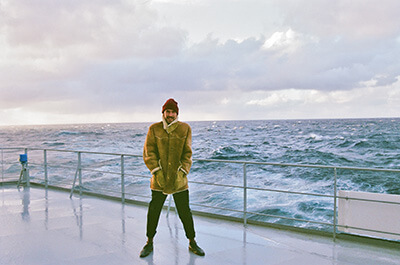
I basically went around the ship exploring, with a couple of mallets and sticks, to see what sounds I could extract from the various metallic surfaces. To my pleasant surprise I found so many differing tones and textures. I basically just collected all of these sounds for the first few days and spent time really listening to what the ship had to say for itself. On windy days I heard the breeze blowing through this metal scaffold pipes up on the captain’s bridge… blowing in a distinct mixolydian mode. I tried to capture that sound for weeks until finally on the last day of the trip, the conditions were perfect, and my little shotgun mic managed to pick up the notes without all the harsh wind interference. I was allowed to access massive cargo holds of the ship, which were essentially these giant oceanic reverb chambers, so I brought some old pipes and hoses..and blew into them to capture the echo and make these wonky horn sections. There was a karaoke room that crew members would make use of each Friday night.…The “messman” had this incredible vulnerable voice so I invited him to sing a little lullaby for his 18-month-old son at home, whom he wouldn’t see for about a year. That’s the voice you can hear on the opening track (“Wind on the Flying Bridge”).
The writing around the record and the documentary depict you using the ship as a gamelan—how did your perception of the boat as an instrument change throughout your trip? Was there any sense of improving as a “player of the boat” during your trip?
It really became more about listening rather than interacting with the ship….I’d really whacked every surface I could after a day or two, so I just engaged with the ship in a more passive way for the weeks that followed. That’s when the beautiful surprises started to emerge. Things like the old WeFax machine which transmits the weather report each day…or the polyrhythms being pumped out by the engine room. So, I suppose my listening skills helped me to improve in “playing” the ship.
Your solo albums, Burning Boy and An Australian Alien, are stylistically very different than Ultra Letizia—I liken your other records to leaning toward the romanticism of Scott Walker where Ultra Letizia feels ambient and abstract akin to Harry Partch or John Cage—where do you think this album falls in the greater scope of your work and how might this record inform your creative projects going forward?
I’m quite restless and I’m not sure I want to repeat myself…. Perhaps I’ll never make music again? Maybe I’ll just tend to my plants for a while. I don’t have a sense of urgency to make something unless it feels necessary to make. There’s an awful lot of “content” out there. I don’t feel like I need to contribute to it most of the time…. unless it feels like I’m really contributing something of worth to the conversation, y’know?
What travel tips do you have for our readers?
Do it as frequently as you possibly can. Even if it’s just an hour away from your home. Just get off the internet and into the world.
What music are you currently listening to?
Bembeya Jazz National and Evelyn Ida Morris.
Can you recommend a product I don’t need?
One of those mushroom suits that you can be wrapped in when you die, so that your body gets metabolized by the mushrooms and absorbed back into the earth.
If you have the opportunity, what other vessel or vehicle might you like to play as an instrument? Why?
A flying saucer
Joe McKee’s album Ultra Letizia is available on cassette and across digital platforms through Salmon Universe. You can listen to select pieces from album, along with Joe’s recommended music.
Related Stories
Popular Stories
If you enjoy The Charlotte News, please consider making a donation. Your gift will help us produce more stories like this. The majority of our budget comes from charitable contributions. Your gift helps sustain The Charlotte News, keeping it a free service for everyone in town. Thank you.
Andrew Zehner, Board Chair



